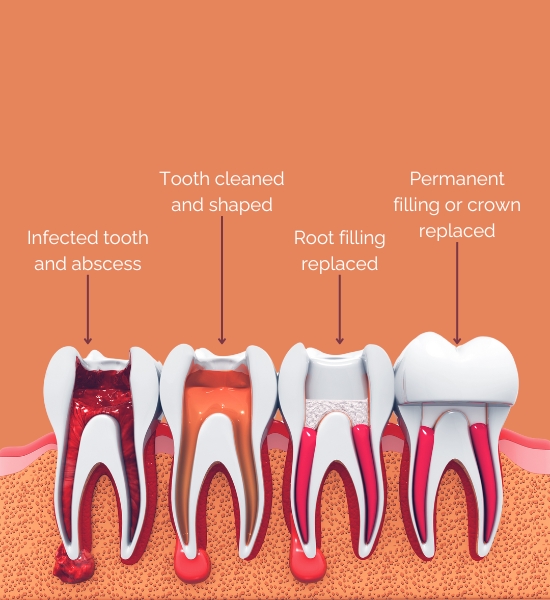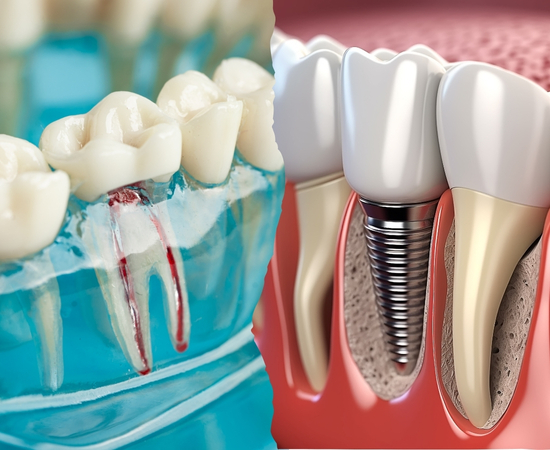Root Canal Perth
At Gentle Dental Centre, we understand that the thought of a root canal can be daunting, but it doesn’t have to be! Our experienced team is committed to providing you with a comfortable and stress-free experience. A root canal is a safe and effective treatment that can save your natural tooth and relieve pain caused by infection or damage. With state-of-the-art technology and a compassionate approach, we ensure that your visit is as pleasant as possible, allowing you to leave with a healthier, happier smile.
Or CALL: (08) 9405 1305
Root Canal Perth

At Gentle Dental Centre, we understand that the thought of a root canal can be daunting, but it doesn’t have to be! Our experienced team is committed to providing you with a comfortable and stress-free experience. A root canal is a safe and effective treatment that can save your natural tooth and relieve pain caused by infection or damage. With state-of-the-art technology and a compassionate approach, we ensure that your visit is as pleasant as possible, allowing you to leave with a healthier, happier smile.
Or CALL: (08) 9405 1305

What is a Root Canal Treatment?
Root canal treatment, also known as endodontics, is a procedure designed to save a severely infected tooth and alleviate pain. During this treatment, we carefully remove the infected tissue, including the pulp, nerves, and harmful bacteria from within the tooth. The pulp is the living tissue that nourishes the tooth, and when it becomes infected, it can lead to significant discomfort.
To restore the tooth’s health and function, we clean out the affected area and fill the space with specialised medicated materials. This process not only preserves your natural tooth but also helps prevent further infection, allowing you to maintain your smile for years to come. At Gentle Dental Centre, we prioritise your comfort and well-being throughout the entire procedure.
How Much Does a Root Canal Cost?
The total cost of a root canal treatment varies, but in Australia, the average ranges from $900 to $3400, excluding a dental crown. Two main factors influence the cost of a root canal:
Location of the affected tooth:
The position of the tooth is a major factor in determining cost. Root canal treatment on a front tooth is generally less expensive because these teeth typically have only one root. Molars, however, can have three or more roots, making treatment more complex and thus more costly. The more roots a tooth has, the more work is required, which increases the cost.
Complexity of the procedure:
If the tooth roots are straight and uncomplicated, the procedure is usually simpler and more affordable. However, if the infection has been present for an extended period, treatment may be more complex and require additional appointments, which can raise the overall cost.
Begin your journey to a beautiful smile at Gentle Dental Centre.


Emergency Root Canal Treatment
Root canal treatments can sometimes be necessary as emergency treatments. If you’re experiencing severe pain, swelling, or infection in your mouth that isn’t alleviated by over-the-counter medications, visit our emergency dentist immediately. These symptoms may indicate a more serious issue that requires root canal treatment.
Timely intervention is crucial, as delaying care can lead to additional damage and the need for more extensive procedures. If you believe you require an emergency root canal, please contact our practice today to address your emergency dental needs.
Can I replace a root canal with a dental implant?
A tooth treated with a root canal, like any other tooth, is still susceptible to decay, so maintaining good oral hygiene is essential. Without proper care, bacteria in your mouth can increase the risk of further decay.
It is possible to replace a root canal with a dental implant. If the root canal fails, your dentist may suggest removing the tooth and replacing it with an implant. However, this option depends on several factors, including success rates, insurance coverage, affordability, dental health, and your overall physical health.

Root Canal or Tooth Out? Which Should You Choose?
Comparing a root canal to extraction can be challenging, but understanding both options can help guide your decision.
When Can a Tooth Be Saved?
A root canal can save teeth with damaged, diseased, or dead pulp as long as the tooth remains otherwise healthy and viable. The pulp, the innermost layer of the tooth, supplies essential blood flow, but it can be damaged by a cracked tooth or a deep cavity. These conditions allow bacteria to enter the pulp, potentially causing infection, swelling, or the death of this vital tissue.
When Should a Tooth Be Extracted?
In some cases, a tooth cannot be saved and may need to be removed. Extraction might be necessary if a cavity is too large, compromising the tooth’s structure beyond repair. Severe fractures may also warrant removal, especially if the crack extends below the gumline, making the tooth too unstable to retain.
Extracting a Tooth with a Root Canal
In some instances, despite efforts to preserve a tooth with root canal therapy, complications may arise, or the tooth may sustain irreversible damage. In such cases, the dentist may suggest extracting the affected tooth.
There are several reasons why a dentist may recommend extracting a tooth that has had a root canal. One primary reason is a persistent or recurrent infection. Even after careful cleaning and sealing, complex root structures or undetected canals can lead to a new infection, causing pain, swelling, and potential abscesses. In such cases, extraction may be necessary to protect your overall oral health and relieve ongoing discomfort.
Additionally, structural damage or fractures can compromise the tooth’s integrity after a root canal. Despite the added strength from a dental crown, factors like trauma or teeth grinding can lead to cracks that increase the risk of infection or make restoration difficult. In these situations, extraction may be advised to prevent further complications and explore alternative tooth replacement options.


Root Canal Treatment Side Effects
Common side effects of a root canal include pain or discomfort, swelling, and, in rare cases, infection. Pain after the procedure is typical and usually mild to moderate, lasting a few days as the tissue around the treated tooth heals. Over-the-counter pain relievers such as ibuprofen or acetaminophen are often recommended to manage this discomfort. Swelling is another common side effect, especially around the treated area, and can be reduced by applying an ice pack to the outside of the cheek in short intervals during the first day. While infection is rare, it can occur if bacteria enter the treated area. Signs of infection include severe pain that doesn’t improve, fever, or swelling that worsens rather than subsides. If any of these symptoms develop, it’s essential to contact your dentist, who may prescribe antibiotics or recommend further treatment.
Needing to Book a Root Canal Treatment?
Our experienced team will guide you through each step, from consultation to aftercare, ensuring a smooth and stress-free experience. Contact us today to schedule an appointment and restore your dental health in a caring, comfortable environment.


